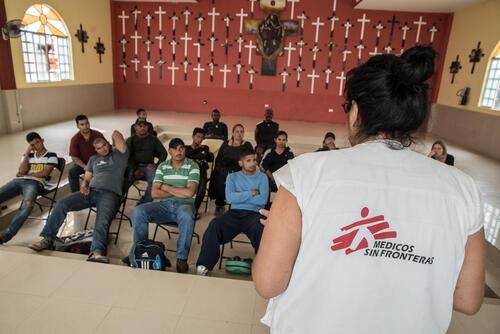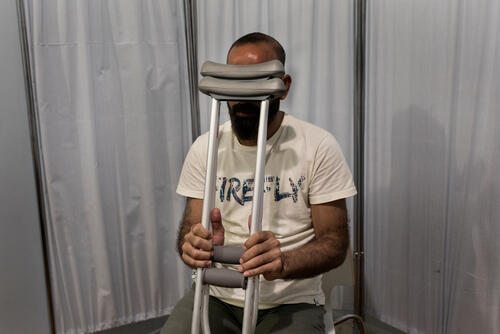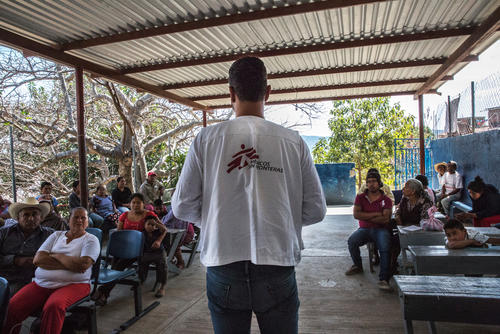Eight years after the 2010 San Fernando massacre, abductions and violence remain a reality for refugees and migrants on their way north from Central America.
Seventy-two human beings – 58 men and 14 women – were kidnapped and murdered in San Fernando, in Mexico’s Tamaulipas state, between 22 and 23 August 2010. They were shot in the neck, their bodies abandoned in a ranch. Their bodies were found by the Navy before the attackers could bury them. They were migrants, making their way to the United States.
The San Fernando massacre put the extreme violence, abuse and mistreatment suffered by migrants in Mexico in the public spotlight.
Eight years on, little has changed for the better. "The violence is ceaselessly spreading,” says María Hernández Matas, coordinator of MSF’s migration project in Mexico. “The migrants and refugees to whom we provide aid are subjected to constant threats and risks along their way. They have been victims of kidnappings, extortion, robbery, threats, physical attacks and sexual abuse.”
“A significant part of MSF's work with migrants and refugees is to treat mental and physical health problems that result from the violence suffered both in Mexico and in their countries of origin,” Hernández explains.
“Those who did not have money were killed”
A 22-year-old Honduran patient in the Coatzacoalcos shelter where MSF works shared his story with the MSF team.
"About four years ago on the [US-Mexico] border in Nuevo Laredo, Tamaulipas, they abducted me and took me to San Fernando, Tamaulipas. There were many other abducted people there with me. We were tied up and blindfolded. They beat us.
They asked us for the phone numbers of our relatives in Honduras and in the United States, to ask them for a $3,000 ransom. Those who did not have money were killed. There were some who paid the ransom, and still they kept them abducted so they could keep asking for more money.
I was afraid. I thought they were going to kill me. I told them that I did not have money; that I was from a poor family. They told me that if my family did not have money, then they would kill me. I cried. I asked them to release me. I saw how they beat people; the women were raped.
They drove us from Nuevo Laredo to San Fernando in a car. It was a nightmare. They did not feed us, they only gave us water. We were abducted for almost two months. One day, at dawn, I heard shots – both inside and coming from outside. When I heard ‘the Navy’, I got up, took off my blindfold and ran away crying.
I didn’t want the same thing that had happened to my uncle to happen to me. He was one of the people murdered in the ‘massacre of the 72’. I found a Navy officer, he told me to stop. I told him I had been abducted and that I was from Honduras.
Now I'm heading north again because, unfortunately, I can no longer live in my country. The reasons I have to leave Honduras are due to the government and the gangs. There’s no work and they charge you a war tax.
My arrival has been very difficult. The past caught up with me. I was abducted again in Coatzacoalcos. Right now I feel fine, because I spoke with psychologists from MSF in the Migrants’ House.
I really was afraid to go on, and then I met the MSF psychologists and they gave me the courage to keep going."
Médecins Sans Frontières (MSF) has been working with migrants and refugees in Mexico since 2012, who are fleeing violence and the lack of opportunities in their countries of origin.
Currently, MSF works to improve access to medical and psychological care for these people along the migration path, prioritising aid for the most vulnerable, such as unaccompanied minors, women travelling alone, and victims of direct violence.
In coordination with the La 72 refugee shelter in Tenosique (Tabasco) and at the Diocesan Migrants’ House in Coatzacoalcos (Veracruz), our teams provide medical services and mental healthcare.
For the most serious cases of survivors or witnesses of extreme violence, torture or cruel, inhuman and degrading treatment, MSF offers multidisciplinary care (medical, mental health and social work) through its comprehensive care centre (Mexico City) and manages specialised medical services for complete rehabilitation.
MSF also has a mobile team – a doctor, a nurse and a psychologist – who regularly visit shelters for migrants and refugees in Reynosa, Tamaulipas.






